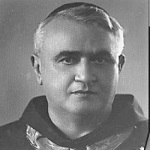 1871 – Born Gjergj Fishta in Fishta, Lezha, Franciscan friar, teacher, writer, translator and also chairman of the commission for drafting the alphabet in the Congress of Manastir, member of the Përmeti government delegation to the Versailles Conference and deputy chairman of the Albanian legislature on 1921 After the second decade of the century. XX, Fishta imposed himself on Albanian culture not only as a writer (poet, playwright, prose writer, etc.), but also as a critic, historian of literature and aesthetes. For half a century he was the dominant figure of Albanian literature, when he was alive, he was crowned “national poet”. After 1945, when the communist regime was established, Fishta’s work was banned and remained so until the communist dictatorship was overthrown. On February 25, 1894 he became a priest leading the first Mass in the church of Troshan. In 1899 he was appointed temporary parish priest in Gomsiqe, under the ecclesiastical jurisdiction of the Abbot. In 1899 he was one of the founding members of the “Union” society. In 1902 he was appointed secretary of the Commissariat General of the Franciscan Mission in Shkodra and in the same year he became the first Albanian director of the Franciscan School. As soon as he took over the running of the school, he changed the language of instruction from Italian to Albanian. On February 15, 1907, together with Gjeçov, he established the first school library in the Albanian lands. In November 1908, the Monastery Congress convened, where Fishta represented the Bashkimi society and gave a lecture “On the Latin Alphabet”, which gave guidance to the agreement on the alphabet. With the uprising over Shkodra in 1911, Archbishop Serreqi, sent by the Ottoman authorities, took Fishta and Bumçi with him to Podgorica to mediate for peace between the authorities and the mountain leaders. With the Austro-Hungarian occupation-administration after 1916, he published the notebook Posta e Shqypniës. On June 6, 1921 he was elected deputy of the prefecture of Shkodra. After the Italian occupation, on June 3, 1939 Fishta was appointed academic of Italy. In 1940, Pope Pius XII received him in a long audience at the Holy See in the Vatican. On December 30, 1940 Fishta passed away. In the wave of the Cultural Revolution, on March 20, 1967, the remains of Fishta were exhumed by the Church of Gjuhadol by order of the structures of the communist state. According to a testimony, his remains with those of other civilians were dumped after three days in the Drin River. But other evidence suggests that the bones were rescued, preserved and secretly buried again in the Rrëmaj cemetery in Shkodra. He was reburied in 1996. In the field of literature, Fishta delivered various genres of both epic and lyrical poetry, satire, drama, journalism and translation. As one of the most representative of romantic poets, he wrote works that develop themes of oral poetry and tradition, relying heavily on folkloric stylistic patterns, including folkloric metrics. On the occasion of his 130th birthday. The Council of the Municipality of Lezha made him an “Honorary Citizen”. In this commemorative meeting, a group of intellectuals asked the District President and the Prefect to make a proposal to the Presidency to award the great poet the high title “Honor of the Nation” for outstanding merits in the service of the Albanian Nation.
1871 – Born Gjergj Fishta in Fishta, Lezha, Franciscan friar, teacher, writer, translator and also chairman of the commission for drafting the alphabet in the Congress of Manastir, member of the Përmeti government delegation to the Versailles Conference and deputy chairman of the Albanian legislature on 1921 After the second decade of the century. XX, Fishta imposed himself on Albanian culture not only as a writer (poet, playwright, prose writer, etc.), but also as a critic, historian of literature and aesthetes. For half a century he was the dominant figure of Albanian literature, when he was alive, he was crowned “national poet”. After 1945, when the communist regime was established, Fishta’s work was banned and remained so until the communist dictatorship was overthrown. On February 25, 1894 he became a priest leading the first Mass in the church of Troshan. In 1899 he was appointed temporary parish priest in Gomsiqe, under the ecclesiastical jurisdiction of the Abbot. In 1899 he was one of the founding members of the “Union” society. In 1902 he was appointed secretary of the Commissariat General of the Franciscan Mission in Shkodra and in the same year he became the first Albanian director of the Franciscan School. As soon as he took over the running of the school, he changed the language of instruction from Italian to Albanian. On February 15, 1907, together with Gjeçov, he established the first school library in the Albanian lands. In November 1908, the Monastery Congress convened, where Fishta represented the Bashkimi society and gave a lecture “On the Latin Alphabet”, which gave guidance to the agreement on the alphabet. With the uprising over Shkodra in 1911, Archbishop Serreqi, sent by the Ottoman authorities, took Fishta and Bumçi with him to Podgorica to mediate for peace between the authorities and the mountain leaders. With the Austro-Hungarian occupation-administration after 1916, he published the notebook Posta e Shqypniës. On June 6, 1921 he was elected deputy of the prefecture of Shkodra. After the Italian occupation, on June 3, 1939 Fishta was appointed academic of Italy. In 1940, Pope Pius XII received him in a long audience at the Holy See in the Vatican. On December 30, 1940 Fishta passed away. In the wave of the Cultural Revolution, on March 20, 1967, the remains of Fishta were exhumed by the Church of Gjuhadol by order of the structures of the communist state. According to a testimony, his remains with those of other civilians were dumped after three days in the Drin River. But other evidence suggests that the bones were rescued, preserved and secretly buried again in the Rrëmaj cemetery in Shkodra. He was reburied in 1996. In the field of literature, Fishta delivered various genres of both epic and lyrical poetry, satire, drama, journalism and translation. As one of the most representative of romantic poets, he wrote works that develop themes of oral poetry and tradition, relying heavily on folkloric stylistic patterns, including folkloric metrics. On the occasion of his 130th birthday. The Council of the Municipality of Lezha made him an “Honorary Citizen”. In this commemorative meeting, a group of intellectuals asked the District President and the Prefect to make a proposal to the Presidency to award the great poet the high title “Honor of the Nation” for outstanding merits in the service of the Albanian Nation.
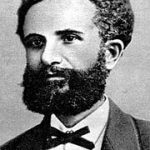 1892 – Abdyl Frashëri dies in Istanbul, he was an Albanian deputy in the Ottoman Parliament, one of the main leaders of the Albanian League of Prizren. He spent the first part of his life in his native village until he was 18 years old. when he settled for work needs in Ioannina. He distinguished himself as a political figure as early as 1877, as soon as it appeared that the Eastern Crisis was endangering Albanian lands. As chairman of the Albanian Committee of Ioannina, which was formed in the same year, he drafted the project of declaring Albania’s independence through the anti-Ottoman liberation uprising. At the end of 1877, Abdyl Frashëri was elected chairman of the Central Committee for the Protection of the Rights of the Albanian Nation, which was formed in Istanbul. As its chairman he made an important contribution to the elaboration of the political platform adopted by the national movement after the Russian victory over the Ottoman Empire and especially after the signing of the Treaty of St. Stephen. As one of the main authors of the political platform of the Istanbul Central Committee, which Abdyl Frashëri presented publicly through articles that he published in several European press during the spring of 1878, he actively participated in the establishment of the Albanian League of Prizren. After the establishment of the League, which adopted this platform, Abdyl Frashëri. was distinguished as its leader and organizer diplomat and its activist. Abdyl Frashëri, defended the Gjirokastra program in the Second Assembly of Dibra where he led as always, the radical wing of the movement. Although the program of autonomy was not accepted by the representatives of the moderate current, he moved to Kosovo and there, together with his Kosovar comrades-in-arms, implemented the decisions of Gjirokastra. He became a member of the Provisional Government that was formed in Prizren in early 1881 and made an important contribution to political and military preparations, which were taken for the defense of autonomy against the Ottoman military expedition. After the suppression of the League, on May 2, 1881 he arrived in Bitola accompanied by a gendarmerie officer and seven cavalry gendarmes. After he was arrested going from Dibra to Elbasan to Mahmud bej Biçakçiu. From there he was sent to Dervish Pasha in Prizren, who imprisoned him in the castle of the city where he stayed for three years, which ruined his health. He was further exiled with his family to Balliqeser and Bandërma in Anatolia for another two years. He was eventually amnestied and returned to Istanbul, where he was appointed representative of the capital’s municipal council.
1892 – Abdyl Frashëri dies in Istanbul, he was an Albanian deputy in the Ottoman Parliament, one of the main leaders of the Albanian League of Prizren. He spent the first part of his life in his native village until he was 18 years old. when he settled for work needs in Ioannina. He distinguished himself as a political figure as early as 1877, as soon as it appeared that the Eastern Crisis was endangering Albanian lands. As chairman of the Albanian Committee of Ioannina, which was formed in the same year, he drafted the project of declaring Albania’s independence through the anti-Ottoman liberation uprising. At the end of 1877, Abdyl Frashëri was elected chairman of the Central Committee for the Protection of the Rights of the Albanian Nation, which was formed in Istanbul. As its chairman he made an important contribution to the elaboration of the political platform adopted by the national movement after the Russian victory over the Ottoman Empire and especially after the signing of the Treaty of St. Stephen. As one of the main authors of the political platform of the Istanbul Central Committee, which Abdyl Frashëri presented publicly through articles that he published in several European press during the spring of 1878, he actively participated in the establishment of the Albanian League of Prizren. After the establishment of the League, which adopted this platform, Abdyl Frashëri. was distinguished as its leader and organizer diplomat and its activist. Abdyl Frashëri, defended the Gjirokastra program in the Second Assembly of Dibra where he led as always, the radical wing of the movement. Although the program of autonomy was not accepted by the representatives of the moderate current, he moved to Kosovo and there, together with his Kosovar comrades-in-arms, implemented the decisions of Gjirokastra. He became a member of the Provisional Government that was formed in Prizren in early 1881 and made an important contribution to political and military preparations, which were taken for the defense of autonomy against the Ottoman military expedition. After the suppression of the League, on May 2, 1881 he arrived in Bitola accompanied by a gendarmerie officer and seven cavalry gendarmes. After he was arrested going from Dibra to Elbasan to Mahmud bej Biçakçiu. From there he was sent to Dervish Pasha in Prizren, who imprisoned him in the castle of the city where he stayed for three years, which ruined his health. He was further exiled with his family to Balliqeser and Bandërma in Anatolia for another two years. He was eventually amnestied and returned to Istanbul, where he was appointed representative of the capital’s municipal council.
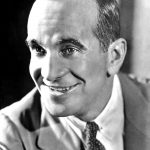 1950 – American comedian, actor, and singer Al Jolson dies at the age of 64. He was named “The Greatest Creator in the World” at the height of his career. His style of interpretation was fragile and extroverted. Al Jolson popularized many songs that took advantage of “his shameless sentimental, melodramatic approach.” In the 1920s, Jolson was America’s most famous and highest-paid entertainer. Some of his most notable films were Swaneey River, Wonder Bar, Jolson Sings Again, and more.
1950 – American comedian, actor, and singer Al Jolson dies at the age of 64. He was named “The Greatest Creator in the World” at the height of his career. His style of interpretation was fragile and extroverted. Al Jolson popularized many songs that took advantage of “his shameless sentimental, melodramatic approach.” In the 1920s, Jolson was America’s most famous and highest-paid entertainer. Some of his most notable films were Swaneey River, Wonder Bar, Jolson Sings Again, and more.
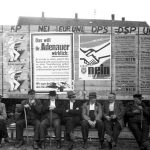 1955 – What is known as the Saar Referendum is held in the Saarland between France and Germany. This referendum would determine the statute of the independent territory under the auspices of a European Commissioner. His rejection by voters was taken as an indication that they would rather join West Germany. On October 27, 1956, France and West Germany concluded the Saarland Treaty by deciding that the Saarland be allowed to join West Germany.
1955 – What is known as the Saar Referendum is held in the Saarland between France and Germany. This referendum would determine the statute of the independent territory under the auspices of a European Commissioner. His rejection by voters was taken as an indication that they would rather join West Germany. On October 27, 1956, France and West Germany concluded the Saarland Treaty by deciding that the Saarland be allowed to join West Germany.
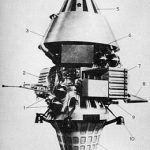 1966 – The Soviets launch the space robot Luna 12. The Luna 12 was launched in the direction of the Moon from an Earth-orbiting platform and reached lunar orbit on October 25, 1966. The spacecraft was equipped with a television system that took and transmitted images of lunar surface. The photos contained scan lines with maximum resolution. Lunar surface photographs were returned on October 27, 1966. Radio broadcasts from Luna 12 ceased on January 19, 1967, after 602 lunar orbits and 302 radio broadcasts.
1966 – The Soviets launch the space robot Luna 12. The Luna 12 was launched in the direction of the Moon from an Earth-orbiting platform and reached lunar orbit on October 25, 1966. The spacecraft was equipped with a television system that took and transmitted images of lunar surface. The photos contained scan lines with maximum resolution. Lunar surface photographs were returned on October 27, 1966. Radio broadcasts from Luna 12 ceased on January 19, 1967, after 602 lunar orbits and 302 radio broadcasts.
 1972 – Operation Linebacker begins in the Vietnam War. Linebacker was the codename for a campaign of military intervention by the Seventh Air Fleet, and the U.S. Navy against the Viet Cong guerrillas. This Operation would last a full 6 months, and would end without any success. And this as the North Vietnamese military troops would cross the counter-offensive towards the southern border. During these battles, 145 American and Vietnamese-South aircraft, as well as 63 North Vietnamese aircraft, would be destroyed.
1972 – Operation Linebacker begins in the Vietnam War. Linebacker was the codename for a campaign of military intervention by the Seventh Air Fleet, and the U.S. Navy against the Viet Cong guerrillas. This Operation would last a full 6 months, and would end without any success. And this as the North Vietnamese military troops would cross the counter-offensive towards the southern border. During these battles, 145 American and Vietnamese-South aircraft, as well as 63 North Vietnamese aircraft, would be destroyed.
 1976 – Famous actor, comedian, producer, and screenwriter Ryan Reinolds is born in Vancouver, Canada. Reynolds, during his 26-year post-cinematic career, would star in films, Deadpool, Buried, X Men Origins, The Proposal, etc. He has been nominated for 42 international awards, where he has won 12 of them. Today Ryan Reynolds, is considered by art critics as one of the most famous comedians in Hollywood.
1976 – Famous actor, comedian, producer, and screenwriter Ryan Reinolds is born in Vancouver, Canada. Reynolds, during his 26-year post-cinematic career, would star in films, Deadpool, Buried, X Men Origins, The Proposal, etc. He has been nominated for 42 international awards, where he has won 12 of them. Today Ryan Reynolds, is considered by art critics as one of the most famous comedians in Hollywood.
 1983 – Two explosive-laden trucks hit the buildings of the US Marines and French troops in Beirut, Lebanon, killing 307 people. Respectively, 241 Americans and 58 French military personnel, six civilians and two peacekeepers. Another 128 Americans were injured in the blast, 13 of whom later died from their injuries. These attacks were carried out by the terrorist organization Hezbollah. The bombs placed on these trucks, according to specialists, resulted in the weight of 10 tons of TNT.
1983 – Two explosive-laden trucks hit the buildings of the US Marines and French troops in Beirut, Lebanon, killing 307 people. Respectively, 241 Americans and 58 French military personnel, six civilians and two peacekeepers. Another 128 Americans were injured in the blast, 13 of whom later died from their injuries. These attacks were carried out by the terrorist organization Hezbollah. The bombs placed on these trucks, according to specialists, resulted in the weight of 10 tons of TNT.
 1993 – A terrorist attack on Shankill Road in Belfast, Northern Ireland. The Shankill Street bombing was carried out by the Irish Republican Army (IRA) on 23 October 1993 and is one of the most notorious Troubles incidents in Northern Ireland. The IRA aimed to assassinate the leadership of the Ulster Defense Association (UDA) by attending a meeting at Frizell Market on Shankill Street. Ten people were killed by one of the IRA terrorists, a UDA member and eight Protestant civilians, two of whom were children. More than fifty people were injured.
1993 – A terrorist attack on Shankill Road in Belfast, Northern Ireland. The Shankill Street bombing was carried out by the Irish Republican Army (IRA) on 23 October 1993 and is one of the most notorious Troubles incidents in Northern Ireland. The IRA aimed to assassinate the leadership of the Ulster Defense Association (UDA) by attending a meeting at Frizell Market on Shankill Street. Ten people were killed by one of the IRA terrorists, a UDA member and eight Protestant civilians, two of whom were children. More than fifty people were injured.






